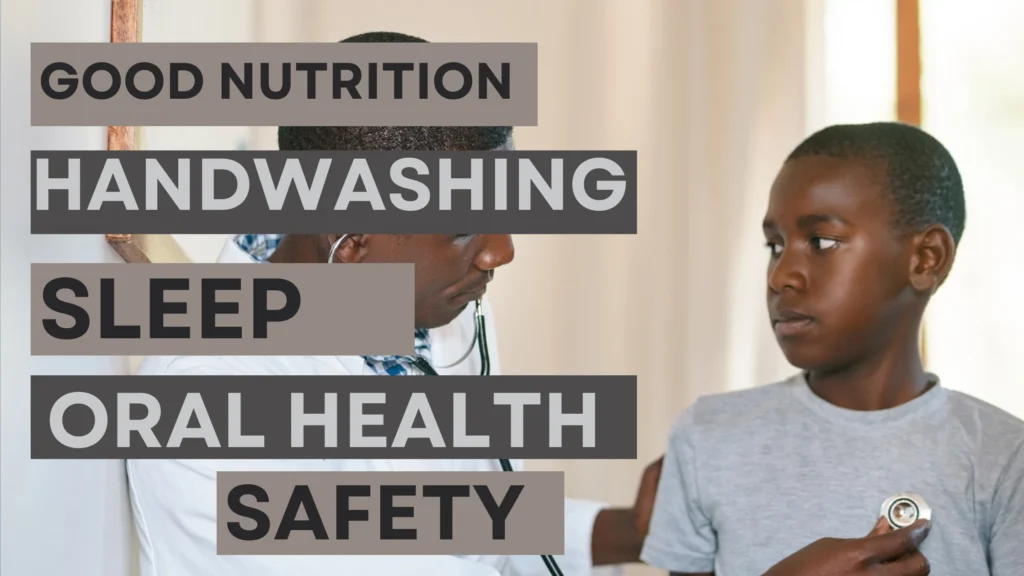Ensuring your child’s overall health and well-being is important as a parent. To ensure your child receives the best care possible, knowing about pediatric care and children’s health is important. This blog post will outline six tips and strategies to help you improve your child’s health and pediatric care. Following these tips ensures your child gets the best care available and leads a healthy life.
1) Handwashing
Handwashing is one of the most important and effective ways to prevent the spread of germs and to maintain your child’s health. It’s especially important to teach your children good handwashing habits when they are young, as good habits can last a lifetime. Proper handwashing should include washing your hands with soap and water for at least 20 seconds. Teaching your children how to properly use alcohol-based hand sanitizers when soap and water are unavailable is also important. Please encourage them to wash their hands before eating or touching their face, after using the restroom, playing outside, blowing their nose, coughing or sneezing, and preparing food. Additionally, ensure that you keep all areas in the home clean and sanitized.
2) Vaccinations
Vaccinations are important to your child’s health and pediatric care, as they help protect your child from dangerous illnesses. Vaccines stimulate the body’s immune system to recognize and fight off infections, reducing the risk of serious diseases.
The CDC recommends that children receive several vaccinations as part of their regular checkups to remain healthy and protected from diseases. Some of the most common vaccinations for children include the DTaP vaccine, which protects against diphtheria, tetanus, and pertussis (whooping cough); the Polio vaccine; and the MMR vaccine, which protects against measles, mumps, and rubella.
It is important to stay up-to-date with your child’s vaccinations, as some require multiple doses or boosters to be effective. In addition, children should receive the flu shot yearly to protect them from seasonal influenza. Talk to your child’s doctor about the recommended immunization schedule for your child.
Following the recommended vaccination schedule can help protect your child from dangerous illnesses and provide them with the best health care possible.
3) Good Nutrition
Ensuring your child eats a healthy and balanced diet is key to ensuring their health and well-being. Start by introducing plenty of fresh fruits and vegetables into their diet, as these are rich in important vitamins, minerals, and antioxidants. It would help if you also aimed to feed them lean proteins, whole grains, and healthy fats like avocado and nuts.
You can encourage healthy eating habits from an early age by teaching them about Nutrition and providing nutritious meals for them to choose from. You can also involve them in meal planning and preparation so they get used to helping in the kitchen.
Please encourage them to stay away from sugary drinks like soda and juices. Instead, serve water or plain milk. If you want to give them a treat, consider natural fruit juices, smoothies, or other treats made with healthy ingredients like yogurt and fruit.
Finally, make sure your child is getting enough fiber in their diet. High-fiber foods such as whole grains, legumes, nuts, seeds, and vegetables are all great sources of fiber that will keep them feeling full and energized throughout the day.

4) Oral Health
Oral health is important for overall health and wellness, especially in children. Properly maintaining good oral health is essential for keeping your child’s teeth and gums healthy. Here are a few tips to promote good oral hygiene in your child:
• Brush twice a day with a soft-bristled toothbrush and toothpaste with fluoride.
• Floss once a day.
• Limit sugary snacks and drinks.
• Use a mouth rinse designed for children.
• Visit the dentist every six months or as recommended by your pediatrician.
• Encourage your child to practice good oral hygiene habits.
Good oral hygiene habits should be established early on and maintained throughout childhood. It is important to remember that when it comes to dental care, prevention is the best medicine! Instilling proper dental care practices in your child at an early age can help them establish strong habits that will last them a lifetime.
5) Sleep
Getting enough sleep is essential for children’s overall health and development. Studies show that lack of sleep can lead to poor academic performance, behavioral issues, and decreased immune system function. It’s important to set a regular bedtime routine for your child and ensure they get adequate sleep each night. According to the American Academy of Pediatrics, infants between four and 12 months old should get 12-16 hours of sleep each day, while toddlers between one and two years old need 11-14 hours of sleep. School-aged children need 9-12 hours of sleep, and teenagers should aim for 8-10 hours each night.
Creating a good bedtime routine will help your child relax and sleep more easily. Start by setting a specific bedtime for your child and stick to it as much as possible. Turn off electronics, including cell phones and television, at least an hour before bedtime. You can also create a calming atmosphere with dim lighting and read stories or play soothing music to help them wind down. Also, avoid eating late at night and ensure your child is not exposed to too much sugar or caffeine close to bedtime. If your child has difficulty sleeping, talk to their pediatrician about strategies to help them rest more comfortably.

6) Safety
Keeping your child safe should be a top priority regarding their health and pediatric care. To ensure your child’s safety, it is important to be aware of potential risks in the home and outdoors.
To protect your child from injury at home:
- Take the time to baby-proof your home.
- Use safety latches on drawers and cabinets, install safety gates at the top and bottom of stairs, ensure all cords are secured and out of reach, use window guards or safety netting, and anchor furniture to the wall.
- Be mindful of hot surfaces and liquids, and always check for choking hazards.
When outdoors, be sure to supervise your child closely. Keep them away from busy roads, water, and construction sites. Wear protective gear such as helmets and knee pads when biking or skateboarding. Make sure they have sunscreen on, and remind them to stay hydrated. Always know where your child is in crowds and hold their hand or keep them close.
Following these simple steps can help protect your child from harm and keep them safe at home and outside.


Write a comment
Your email address will not be published. All fields are required